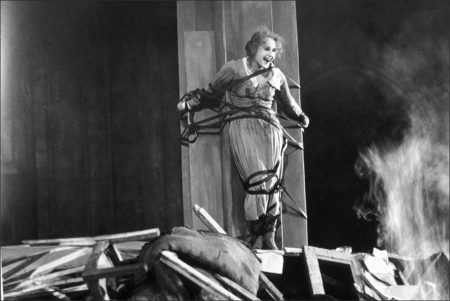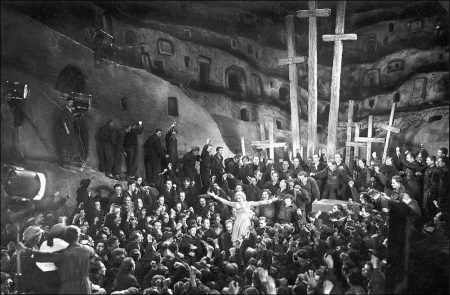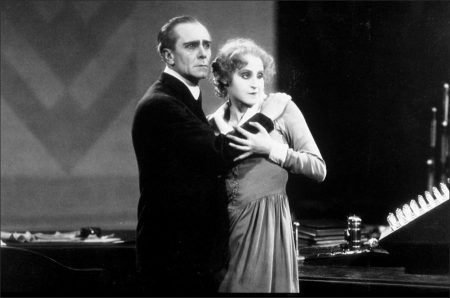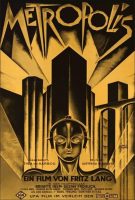Metropolis movie storyline. Freder (Gustav Fröhlich), the young son of a ruling, aristocratic capitalist Master Joh Fredersen (Alfred Abel), discovers the miserable life of the proletariat when he notices a beautiful young woman Maria (Brigitte Helm) with a group of worker children and pursues her into the squalid, labyrinthine underground slums. The wistful, Christ-like young woman urges her comrades to peacefully await their salvation.
After discovering their meeting, Freder’s father instructs mad scientist Rotwang (Rudolf Klein-Rogge) to create an evil robotic Maria look-alike that will manipulate the workers, preach rebellion, and cause their elimination. The false Maria goes beserk and incites the workers to revolt, causing a cataclysmic flood. Freder and the real rescued Maria lead the worker children out of danger, and Joh Fredersen is convinced to reconcile with the workers – Capital and Labor united in Love.
A stylized, visually-compelling, melodramatic silent film set in the 21st century city of Metropolis – Lang’s German Expressionistic masterpiece helped develop the science-fiction genre. The luxurious, futuristic city of skyscrapers and bridges is stratified and divided into an upper, elite, privileged class and a subterranean, nameless, oppressed, ant-like worker / slave class.
Metropolis is a 1927 German expressionist epic science-fiction drama film directed by Fritz Lang. Scripted by Thea von Harbou, with collaboration from Lang himself, it starred Gustav Fröhlich, Alfred Abel, Rudolf Klein-Rogge and Brigitte Helm. Erich Pommer produced it in the Babelsberg Studios for Universum Film A.G. (Ufa). The silent film is regarded as a pioneering work of the science-fiction genre in movies, being among the first feature-length movies of the genre.
Made in Germany during the Weimar Period, Metropolis is set in a futuristic urban dystopia and follows the attempts of Freder, the wealthy son of the city’s ruler, and Maria, a poor worker, to overcome the vast gulf separating the classes of their city. Filming took place in 1925 at a cost of approximately five million Reichsmarks. The art direction draws influence from Bauhaus, Cubist and Futurist design.
Metropolis was met with a mixed reception upon release. Critics found it pictorially beautiful and lauded its complex special effects, but accused its story of naiveté. The film’s extensive running time also came in for criticism, as well as its alleged Communist message. Metropolis was cut substantially after its German premiere, removing a large portion of Lang’s original footage.
Numerous attempts have been made to restore the film since the 1970s. Music producer Giorgio Moroder released a truncated version with a soundtrack by rock artists such as Freddie Mercury, Loverboy and Adam Ant in 1984. A new reconstruction of Metropolis was shown at the Berlin Film Festival in 2001, and the film was inscribed on UNESCO’s Memory of the World Register in the same year, the first film thus distinguished. In 2008, a damaged print of Lang’s original cut of the film was found in a museum in Argentina. After a long restoration process that required additional materials provided by a print from New Zealand, the film was 95% restored and shown on large screens in Berlin and Frankfurt simultaneously on 12 February 2010.
Special Effects and Influences on Cinema
Metropolis features a range of elaborate special effects and set designs, ranging from a huge gothic cathedral to a futuristic cityscape. In an interview, Fritz Lang reported that “the film was born from my first sight of the skyscrapers in New York in October 1924”. He had visited New York City for the first time and remarked “I looked into the streets – the glaring lights and the tall buildings – and there I conceived Metropolis,” although in actuality Lang and Habou had been at work on the idea for over a year. Describing his first impressions of the city, Lang said that “the buildings seemed to be a vertical sail, scintillating and very light, a luxurious backdrop, suspended in the dark sky to dazzle, distract and hypnotize”. He added “The sight of Neuyork [sic] alone should be enough to turn this beacon of beauty into the center of a film…”
The appearance of the city in Metropolis is strongly informed by the Art Deco movement; however it also incorporates elements from other traditions. Ingeborg Hoesterey described the architecture featured in Metropolis as eclectic, writing how its locales represent both “functionalist modernism [and] art deco” whilst also featuring “the scientist’s archaic little house with its high-powered laboratory, the catacombs [and] the Gothic cathedral”. The film’s use of art deco architecture was highly influential, and has been reported to have contributed to the style’s subsequent popularity in Europe and America.
Lang’s visit to several Hollywood studios in the same 1924 trip also influenced the film in another way: Lang and producer Erich Pommer realized that to compete with the vertical integration of Hollywood, their next film would have to be bigger, broader, and better made then anything they had made before. Despite Ufa’s growing debt, Lang announced that Metropolist would be “the costliest and most ambitious pictyure ever.”
The film drew heavily on biblical sources for several of its key set-pieces. During her first talk to the workers, Maria uses the story of the Tower of Babel to highlight the discord between the intellectuals and the workers. Additionally, a delusional Freder imagines the false-Maria as the Whore of Babylon, riding on the back of a many-headed dragon.
The name of the Yoshiwara club alludes to the famous red-light district of Tokyo. Much of the plot line of Metropolis stems from the First World War and the culture of the Weimar Republic in Germany. Lang explores the themes of industrialization and mass production in his film; two developments that played a large role in the war. Other post-World War I themes that Lang includes in Metropolis include the Weimar view of American modernity, fascism, and communism.
Metropolis (1927)
Directed by: Fritz Lang
Starring: Brigitte Helm, Alfred Abel, Gustav Fröhlich, Fritz Rasp, Rudolf Klein-Rogge, Theodor Loos, Erwin Biswanger, Heinrich George, Beatrice Garga, Grete Berger, Olly Boeheim, Ellen Frey
Screenplay by: Fritz Lang
Cinematography by: Karl Freund, Günther Rittau, Walter Ruttmann
Costume Design by: Aenne Willkomm
Art Direction by: Otto Hunte, Erich Kettelhut, Karl Vollbrecht
Music by: Gottfried Huppertz
MPAA Rating:
Distributed by: Parufamet
Release Date: January 19, 1927
Visits: 299



